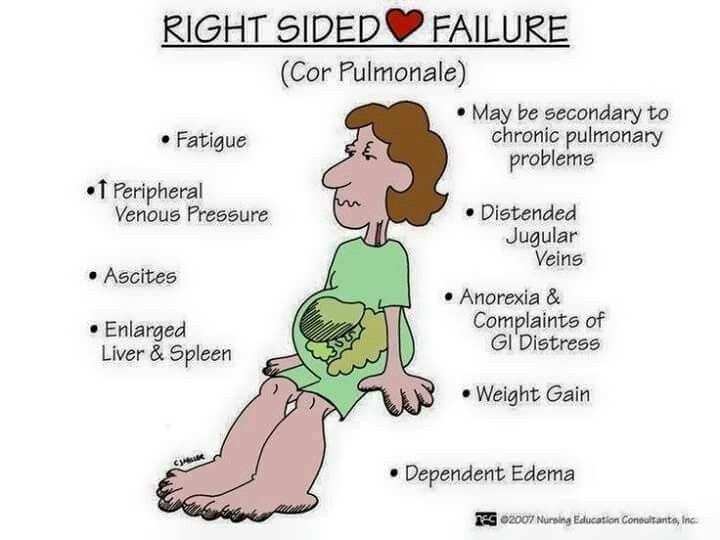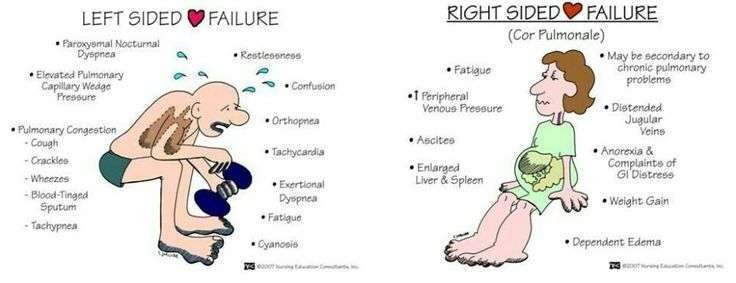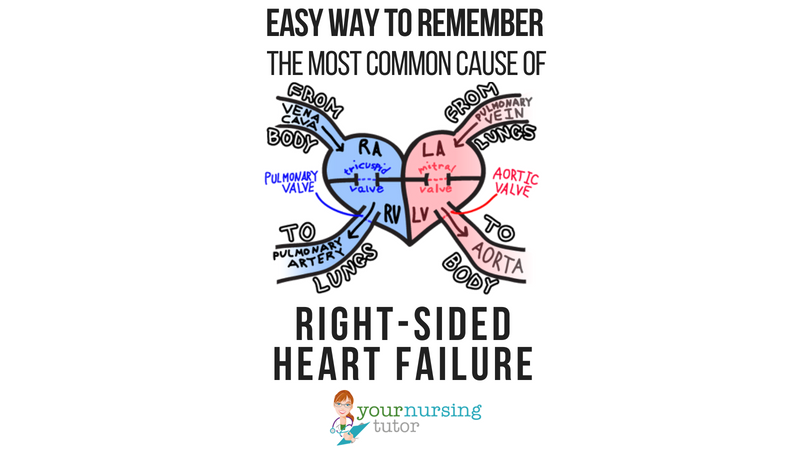Weight Gain And Increased Urination
Weight gain. Weight gain is common with an increase in fluid retention. This may come on gradually or relatively quickly. One way to measure the effectiveness of treatment is to monitor your daily weight is.
Frequent urination during the night . When excess fluid is mobilized, the kidneys recognize the extra water within the bloodstream and they may produce more urine. This often occurs at night when the legs are elevated leading to frequent nighttime urination .
What Is Right Sided Heart Failure
The heart is unable to pump blood properly to the lungs in right sided heart failure. This usually happens in most people because of some problem with the left ventricle. However, it can also be caused by reduced functioning of the right ventricle.
Symptoms of Right Sided Heart Failure
Physical examination of a person suffering from right sided heart failure will reveal peripheral edema, liver enlargement and ascites. The fluid status is checked by jugular venous pressure, which usually gets accentuated by the hepatojugular reflux. If there is an increase in the right ventricular pressure, there will be presence of parasternal heave.
Congestion of systemic capillaries occurs when there is backward failure of the right ventricle. As a result, there will be peripheral edema, swelling in foot and ankle in people who are mostly standing and sacral edema in people who are lying down. It can also cause nocturia, when the body fluid returns to the blood stream after lying down.
Ascites will be caused in severe cases, which will further lead to liver enlargement and impaired liver functioning. Other symptoms are jaundice and coagulopathy.
Faces Of Heart Failure
Heart failure occurs when something damages the heart muscle or reduces the heart’s ability to pump effectively. Most often, the damage stems from coronary artery disease or heart attack. But faulty heart valves, longstanding high blood pressure, or genetic disease may also be to blame. No matter what the cause, the failing heart can no longer pump well enough to keep up with the body’s demand for oxygen-rich blood.
To help both doctors and patients quickly spot a possible combination of heart failure symptoms, the Heart Failure Society of America developed a handy tool that goes by the acronym FACES.
F = Fatigue. When the heart can’t pump enough oxygen-rich blood to meet the body’s energy needs, a general feeling of tiredness or fatigue sets in.
A = Activity limitation. People with heart failure are often unable to do their normal activities because they become easily tired and short of breath.
C = Congestion. Fluid buildup in the lungs can result in coughing, wheezing, and breathing difficulty.
E = Edema or ankle swelling. When the heart doesn’t have enough pumping power to force used blood back up from the lower extremities, fluid can collect in the ankles, legs, thighs, and abdomen. Excess fluid can also cause rapid weight gain.
You May Like: How Does Heart Disease Affect The Nervous System
Outlook For Heart Failure
Heart failure is a serious long-term condition that will usually continue to get slowly worse over time.
It can severely limit the activities you’re able to do and is often eventually fatal.
But it’s very difficult to tell how the condition will progress on an individual basis.
It’s very unpredictable. Lots of people remain stable for many years, while in some cases it may get worse quickly.
What Are Compression Socks

- Compression stockings are specially made, snug-fitting, stretchy socks that gently squeeze your leg.
- Graduated compression or pressure stockings are tighter around your ankle and get looser as they move up your leg.
- Compression sleeves are just the tube part, without the foot.
- Pressure from compression socks helps the blood vessels work better in the legs. This allows the arteries that take oxygen-rich blood to the muscles can relax, so blood flows freely. The veins get a boost pushing blood back to the heart.
- Compression stockings are a worm for comfort, to help prevent serious medical conditions, and compete better in sports.
- Compression stockings can:
- Lower the chances of getting a blood clot in the leg
- Lessen pain and leg swelling
People should who wear compression socks include:
- People with or at risk for circulation problems, like blood clots in the leg , varicose veins, or diabetes
- People who have just had surgery
- People who can’t leave their bed or have a hard time moving their legs
- People who stand all day at work
- Athletes
Don’t Miss: What I Felt Before My Heart Attack
What Are The Symptoms Of Heart Failure
The main symptoms of heart failure are:
- Shortness of breath when youre active or resting, because youre not getting enough oxygen.
- Swollen feet, ankles, stomach and around the lower back area, caused by fluid build up.
- Feeling unusually tired or weak because theres not enough blood and oxygen getting to your muscles.
You should see your GP immediately if you begin to experience any of these symptoms.
What Is Heart Failure
Although the term heart failure suggests your heart isnt able to function at all, it actually means your heart muscles just arent functioning well enough to support your bodys needs. It develops when your heart muscles are either too weak or not elastic enough to pump blood properly. About 6.2 million people in the United States are living with heart failure.
Heart failure is usually a chronic and progressive condition, but it can develop quickly after a heart attack or other conditions that damage your heart. The most common cause of heart failure is coronary artery disease, which is a narrowing of the arteries that supply blood to your heart.
Also Check: Do Heart Attacks Last For Days
Clinical Characteristics And Evaluation
Clinical characteristics of right-sided HF are caused by increased pressure in the right atrium and reduced left ventricular filling as a result of the effect of ventricular interdependence. Elevated central venous pressure impedes lung lymphatic drainage, so in patients with pulmonary hypertension resulting from left-sided heart diseases, lung fluid clearance decreases and excessive pulmonary edema can lead to pleural effusion.
Types Of Heart Failure
divides heart failure into one of three categories based on the part of your heart thats affected:
- Diastolic failure. This means your left ventricle doesnt relax properly due to stiffness and your heart doesnt fill with enough blood between beats, or the pressure for the heart to function is very high.
- shortness of breath when lying down
- sleeping on extra pillows at night
Don’t Miss: Does Losartan Lower Heart Rate
History And Physical Exam
A clinician listens to your heart and lungs and measures your blood pressure and weight. They will also ask about your:
- Familys medical history, especially previous cardiac problems
- Lifestyle
- Medications, including prescriptions, over-the-counter drugs and supplements
- Personal medical history
Blood tests can measure several things related to heart failure:
- Sodium and potassium levels
- Creatinine, which helps measure how well your kidneys are working
- B-type natriuretic peptide , a hormone released from the ventricles in response to increased wall tension that occurs with heart failure
What Do I Need To Know About Heart Failure
Heart failure is a condition that does not allow your heart to fill or pump properly. Heart failure may begin on the left or right side of the heart. If one side does not work properly, the other side has to work harder to function. Over time, heart failure affects both sides of the heart. Heart failure is a long-term condition that tends to get worse over time. It is important to manage your health to improve your quality of life.
You May Like: Which Part Of The Heart Pumps Blood Into The Aorta
Can I Improve My Heart Failure Naturally
If your doctor prescribes you medication its important to take it. But making changes to your lifestyle is also going to have a big impact on improving your health.
Changes may include:
- weighing yourself regularly sudden weight gain may mean too much fluid is building up in your body
- watching the amount of fluid you have each day
- limiting how much alcohol you drink
- keeping active this can help improve your energy, stamina and fitness
- keeping to a healthy weight, which will help to prevent your heart from working too hard.
Diet changes are also essential when managing your weight and keeping your heart healthy.
You could feel healthier by eating:
- one or two portions of fruit or veg with every meal
- sunflower oil, olive oil, nuts and avocados instead of saturated fat options like crisps and butter
- one or two portions of beans or pulses everyday with a meal
- your protein in the form of fish, eggs and lean meats
- less salt and sugar.
Heart Failure Signs And Symptoms

By themselves, any one sign of heart failure may not be cause for alarm. But if you have more than one of these symptoms, even if you haven’t been diagnosed with any heart problems, report them to a healthcare professional and ask for an evaluation of your heart. Congestive heart failure is a type of heart failure which requires seeking timely medical attention, although sometimes the two terms are used interchangeably.
This table lists the most common signs and symptoms, explains why they occur and describes how to recognize them.
Read Also: How Is Heart Failure Diagnosed
What Are The Treatments For Heart Failure
There isn’t a cure for heart failure but the treatments available can control symptoms leading many people to live full and active lives. Your doctor will usually tell you what stage of heart failure you’re in. This is graded in class from 1 to 4. 1 is the less severe and 4 is the most. Knowing this will help your doctors choose the best treatment for your condition.
Treatments for heart failure can include:
- medication – to improve your symptoms and reduce fluid build up
- a pacemaker or ICD – to help your heart pump blood around your body
- coronary bypass surgery – if you have blocked arteries.
Stomach Pain And Weight Gain
Sometimes you might eat just a little, yet suddenly feel very full. But even though you are barely eating, you notice that youâre somehow gaining weight. Thatâs also from all the fluid that youâre collecting in your body.
When the liver gets swollen from it , it may cause stomach pain on the upper right side. Some people think they might have an inflamed gallbladder. It’s actually an enlarged liver.
Read Also: Heart Rate When Having A Heart Attack
What Are The Causes
Sometimes it just happens. But usually itâs left-side heart failure that causes right-side heart failure. As the left chamber of your heart loses some of its ability to pump, blood continues to back up — sometimes into your lungs.
Heart failure is a long-term condition that gets worse over time. In most cases, you get it because you have other health issues that have damaged or weakened your heart.
Some other causes of right-side heart failure include:
Coronary artery disease. This is the most common form of heart disease and cause of heart failure. When you have coronary artery disease, plaque blocks your arteries, causing blood flow to your heart muscle to slow or even stop. Read more on clogged arteries and the causes of arterial plaque.
High blood pressure. It measures how hard your heart pumps blood through your arteries. The higher your blood pressure, the harder your heart is working to pump it. That means over time, your heart muscles can thicken and weaken because of the extra work they do. Learn about the symptoms of high blood pressure.
Damaged heart valves. Valves keep blood flowing in the right direction through your heart. If they get damaged, by an infection or heart defect, for instance, your heart has to work harder to pump blood. Eventually, it will become weakened. Get more information on heart valve disease symptoms and causes.
What Do The Left And Right Sides Of The Heart Do
The two sides of your heart work in different ways to pump blood.
- Left side: Receives oxygen-rich blood from your lungs and delivers it to the rest of your body. The oxygen helps organs, muscles and other tissue do their job.
- Right side: Receives oxygen-poor blood from your body and delivers it to your lungs. From there, you release carbon dioxide and take in more oxygen.
Recommended Reading: What Causes Afib After Heart Surgery
How Can You Treat Right
Your doctor will come up with a suitable treatment plan for you, which may involvecardiac rehabilitation and surgery.
Unlike left-sided heart failure, the treatments for right-sided heart failure are less straightforward.
The treatment is directed at the underlying causes of right ventricular dysfunction. If you have right-sided heart failure, your doctor will instruct you to manage your symptoms by taking diuretics, eating a low-salt diet, and limiting fluid intake. These treatments are advised for all people with right-sided heart failure.
Other suggested treatments are based on the most likely cause of right-sided heart failure.
Medications For Heart Failure
Certain medications can help treat heart failure and its underlying cause:
- Aldosterone blockers block the effects of the hormone aldosterone, encouraging the body to release sodium and water. They also help prevent scarring in the heart.
- Angiotensin receptor-neprilysin inhibitor : Treatment with sacubitril-valsartan reduces excess fluid in the body and relaxes blood vessels. This makes it easier for your heart to pump blood. Alternatives to ARNIs include angiotensin-converting enzyme inhibitors andangiotensin receptor blockers .
- Beta blockers make the heart beat more slowly and with less force. They also help keep heart rhythm regular.
- Sodium-glucose transport protein 2 inhibitors are diabetes drugs that have recently been found to be very beneficial in heart failure. They help remove glucose via the kidneys into the urine.
Other medications can relieve the heart failure symptoms:
- Diuretics reduce the amount of fluid in the body.
- Vasodilators dilate the blood vessels and reduce the hearts workload.
- Digoxin helps the heart beat stronger with a more regular rhythm.
- Anti-arrhythmics control arrhythmia and maintain normal heart rhythm.
You May Like: Which Of The Following Body System Responses Correlates With Systolic Heart Failure (hf)
Questions To Ask Your Medical Professional
Here are some helpful questions to ask your healthcare professional about right-sided heart failure:
- What treatment options do I have to manage my condition?
- What kinds of foods should I limit in order to prevent swelling?
- How much fluid should I drink every day?
- How can I stop my heart failure from getting worse?
Right Sided Vs Left Sided Heart Failure

When right sided heart failure occurs, the increased pressure in the veins causes dispersion of fluid to surrounding tissues. This happens because this side of the heart is too weak to pump blood forward to the lungs.
The result may be a buildup of fluid in various parts of the body, including the legs, abdomen, and liver.
When left sided heart failure occurs, a person
Right sided heart failure can be due to the following conditions:
Recommended Reading: How To Lower My Resting Heart Rate
Life Expectancy With Congestive Heart Failure
The life expectancy of someone with congestive heart failure depends on the type of heart failure, the cause, the stage of the disease, and how effective treatment is.
When heart failure results from cardiomyopathy or coronary artery disease, a person typically has a less positive outlook than someone with heart failure in its earliest stage.
Frequent Urination At Night
One of the other symptoms of this condition is frequent urination at night, which is also known as nocturia. This is usually seen as an effect of the edema, wherein the fluid that gets accumulated on the ankle and legs returns into systemic circulation when the person is sleeping or is in supine position. This leads to excessive urine being produced, and hence excess urination.
You May Like: Why Do Anti Inflammatories Cause Heart Attacks
Treatments For Heart Failure
Treatment for heart failure usually aims to control the symptoms for as long as possible and slow down the progression of the condition.
How you’re treated will depend on what is causing your heart failure.
Common treatments include:
- lifestyle changes including eating a healthy diet, exercising regularly and stopping smoking
- medicine a range of medicines can help many people need to take 2 or 3 different types
- devices implanted in your chest these can help control your heart rhythm
- surgery such as a or a heart transplant
Treatment will usually be needed for life.
A cure may be possible when heart failure has a treatable cause. For example, if your heart valves are damaged, replacing or repairing them may cure the condition.
Symptoms Of Heart Failure
The main symptoms of heart failure are:
- breathlessness after activity or at rest
- feeling tired most of the time and finding exercise exhausting
- feeling lightheaded or fainting
- swollen ankles and legs
Some people also experience other symptoms, such as a persistent cough, a fast heart rate and dizziness.
Symptoms can develop quickly or gradually over weeks or months .
Recommended Reading: How To Know If You’re Having A Heart Attack
